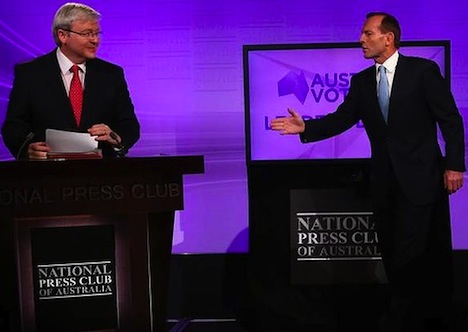 Photo credit to UPI/Bettman Newsphotos.
Photo credit to UPI/Bettman Newsphotos.
Gough Whitlam served as Australia’s prime minister for just three years, but the tumultuous Whitlam era gave the country its most severe constitutional crisis, a universal health care program, diplomatic ties with the People’s Republic of China and a progressive statesman whose spirit continues to guide the Australian left today. Notably, his short-lived government was the only one headed by the center-left Australian Labor Party between 1949 and 1983.![]()
Whitlam, who died today at age 98, left office in 1975 after Australia’s governor-general, Sir John Kerr, controversially dismissed him as prime minister, transforming Whitlam into something of a martyr. Whitlam lived for nearly four decades to watch seven more prime ministers come and go, including the internecine battles between the two prime ministers from within his own Labor Party between 2007 and 2013, Kevin Rudd and Julia Gillard.
Whitlam personified the hope of the new post-war generation when he came to power in 1972, the first center-left prime minister in over two decades. Despite the opposition of the newly dethroned center-right Coalition of the Liberal Party and the Country National Party, Whitlam introduced a whirlwind of legislation. He created a national healthcare system, Medicare (initially ‘Medibank’), abolished student university fees, eliminated the federal death penalty, withdrew Australian troops from Vietnam and, most controversially at the time, recognized Beijing over Taipei. Within Australia, Whitlam delivered to the Northern Territory and the Australian Capital Territory representation in the Australian parliament’s upper house, the Senate, fought for environmental protections for the Great Barrier Reef (including a ban on offshore oil drilling) and delivered greater control over tribal lands in the Northern Territory for Australia’s indigenous population.
He introduced Australian, rather than British, passports and he replaced ‘God Save the Queen’ with an Australian national anthem. Decades later, he would team up with his former Liberal rivals to support an Australian republic in an unsuccessful 1999 referendum.
There’s no real direct analog to Whitlam in the United States, but you might think of him as Australia’s combination of John Kennedy, Lyndon Johnson and Jimmy Carter — all in one person and packed into three very tumultuous and very active years in office. Continue reading Remembering Gough Whitlam, Australia’s progressive martyr
